A transaction fee is a cost associated with buying, selling, or transferring a certain quantity of cryptocurrency from one wallet or exchange to another.
High gas fees and transaction costs have long been a complaint of cryptocurrency traders. When investing in cryptocurrencies, you should be aware that there are generally three different types of transaction costs: exchange fees, network fees, and wallet fees.
Different Types of Crypto Transaction Fees?
As mentioned earlier, the types of costs you'll find in DeFi include exchange fees, network fees, and wallet fees.
The amount charged by a cryptocurrency exchange to fulfill a purchase or sell order is referred to as an exchange fee. These fees are also one of the key sources of revenue for exchanges, and they are frequently a vital aspect of their business operations and strategy. Network fees are costs paid to the network, which include fees paid to Bitcoin miners for the services they perform. Unfortunately, network fees are based on demand, which means that when the network is crowded, the rates increase, and vice versa. When people withdraw or transmit Bitcoin from one wallet to another, they incur wallet fees. However, many exchanges and applications now have platform wallets. Fees in these circumstances are often small if not nil.
In summary, crypto transaction fees are costs that a user must pay when sending money to an exchange to purchase Bitcoin or while conducting cryptocurrency transactions. However, the amount of these costs will be determined by the underlying network and exchange.
Crypto Transaction Fees vs. Traditional Wire Transfer Fees
A wire transfer is an electronic payment service that allows you to send money through the wire, such as SWIFT, the Federal Reserve Wire Network, or the Clearing House Interbank Payments System. When you make an overseas transfer, the intermediary that handles the transaction charges a fee.
Customers pay particular fees to intermediaries such as banks or payment systems such as PayPal. PayPal, for example, costs 4.4% of the transaction for international transfers, while banks such as Chase and Bank of America impose exorbitant incoming and outgoing wire fees.
The procedure for cryptocurrency is different. Users just convert their money to Bitcoin on a decentralized exchange, enter the destination address, pay the transaction charge, and send. The transaction fee is paid to the miners/validators in this situation. This charge, however, changes according to the blockchain network utilized for the transactions.
However, certain centralized exchanges will levy additional transaction fees. These transaction costs apply not just to transfers but also to cryptocurrency purchases made using bank cards.
Per Example Ethereum and D-Chain Network Transaction Fees
Fees are measured based on the gas in D-chain or any other related network, and here the gas represents how computational cost happens during the transaction process. Users need to pay petrol costs for completing a cost or to execute a smart contract. Surprisingly, the cost consumers pay on each Bitcoin transaction is set by the amount they are willing to spend. Outbidding occurs in certain situations. The more customers who are prepared to pay for their transactions to be processed, the quicker those transactions will be completed. This is because miners who are in charge of validating transactions prioritize transactions with greater fees over transactions with lower costs.
Because of this staggered characteristic, outbidding other people's transactions makes sense when hundreds of millions of transactions are involved. People who are transferring such enormous quantities of money will not mind paying a small cost in contrast. On the other side, if users are making tiny transactions, there is no need to outbid other transactions. However, modest transactions are executed as well, albeit a little slowly.
This shows that transaction cost plays a major role in the transaction process. Different blockchain networks will charge a transaction cost based on the traffic of the network. Among the other blockchain networks, it came to know that the Ethereum networks charge a high amount of transaction cost. Even though it changes a high fee, the network is so secure and scalable. It is so easy when the transaction cost is 0%, and thanks to the D-chain network. D-chain Network is part of the D-Ecosystem which charges a 0% of transaction fee and is highly secured and scalable.
Which is a better choice: paying cryptocurrency transaction fees or intermediary fees?
This is an ongoing debate among crypto users. While banks and financial intermediaries are regulated, cryptocurrencies are recognized for having reduced transaction fees. Furthermore, most nations do not regulate cryptocurrencies, and banks charge exorbitant costs to move money from one jurisdiction to another. As a result, when it comes to fees, cryptos are always better than financial middlemen.
For Example, Traditional bank transfers of $1,000 will require approximately $30 in transaction fees. But while holding Bitcoin transfer, it will take around $5 for the respective blockchain network. It is so important to select the network wisely. Hence, choosing the D-chain network will be the best choice because the transaction cost will be 0% and moreover, the network is more secure and scalable.
What Cryptocurrencies Have the Lowest Transaction Fees?
A $1,000 amount that transfers on the Bitcoin network will cost around $5, and $3 will be charged for the Ethereum network. On the TRON network, however, an identical transaction would cost less than $1. There are various coins present in the crypto world like Ethereum, Nano, Classic, Bitcoin SV, IOTA, Bitcoin Gold, Dash, Litecoin, and DOGE which charge low transaction costs. Moreover, the D-coin which is developed in the D-Chain network will cost 0% transaction cost.
There is a lot to learn about consensus processes in order to understand how certain networks manage to charge fewer fees than others. The aim is to select a platform that handles transactions quickly and affordably.
Conclusion
Transaction fees have long been an important component of the financial and investment services sector, and crypto is no exception. This is because the revenue received from these fees is needed by exchanges to sustain their businesses, allowing them to provide a route for investors to invest in cryptocurrency. Additionally, crypto network transaction fees are required since they incentivize miners to continue their part in maintaining the blockchain network.
However, due to escalating fees for regular bank transfers, many people throughout the world have turned to cryptocurrencies to send or receive money from overseas. The reason for this is that many individuals are realizing that crypto transactions are both speedy and cheap.








